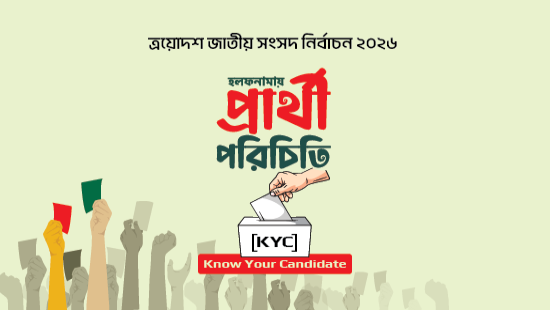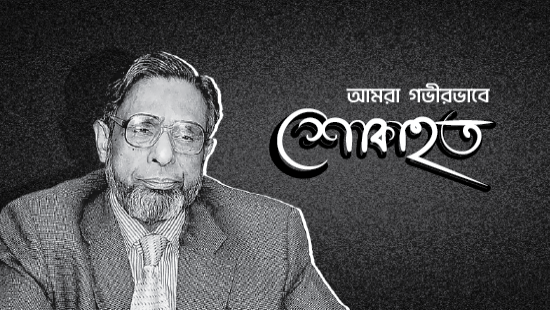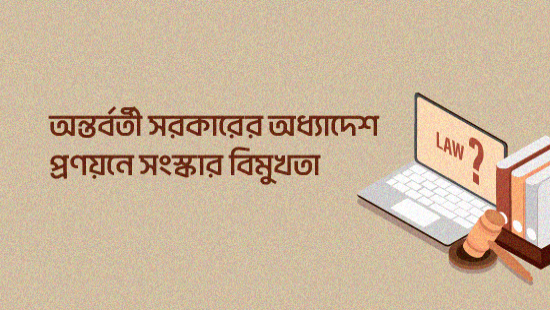Press Release
Dhaka, 04 August 2025: Since assuming office, the interim government has undertaken several initiatives, including the withdrawal of nearly all harassment cases filed across the country during the student-popular uprising, the initiation of judicial proceedings against those involved in the killings during the mass uprising, signing the International Convention against Enforced Disappearances, formation of 11 reform commissions in two phases based on sectors and institutions, establishment of a National Consensus Commission, enactment of 50 laws, reinstatement of the Supreme Judicial Council, finalization of the draft Supreme Court Secretariat Ordinance 2025, promulgation of the July Martyrs and Fighters Welfare and Rehabilitation Ordinance 2025, reconstitution of the Election Commission in accordance with existing laws, and the formation of various committees and task forces as well as the preparation of reports aimed at reforming the financial sector.
The government's decision-making has often been marked by an ad hoc approach, with noticeable gaps in firmness and strategic planning in administrative governance. A lack of coordination among responsible officials has also been evident, leading in some cases to indecision or reversal of decisions once made. While efforts to depoliticize the administration through the removal of high-ranking officials affiliated with a particular political party have been observed, this has, in practice, been replaced by politicization under a different party alignment, effectively sustaining the same trend. Additionally, instability within state institutions—particularly in the police and civil administration—efforts to form new political circles, and frequent reshuffling of personnel have contributed to institutional inefficiency. These developments have also revealed a lack of effective control by the government. Most notably, internal resistance has hindered institutional reform efforts, preventing the realization of expected outcomes in this area.
The prioritization of individual agendas has led to divisions and conflicts among the various stakeholders involved in the uprising, casting uncertainty over the realization of the aspirations for state reform that emerged from the popular movement. A clear rift has become apparent regarding fundamental reforms, with a greater emphasis placed on gaining power through elections rather than on structural transformation. Regrettably, there has been no fundamental shift in Bangladesh’s political culture—partisanship, extortion, land grabbing, and the pursuit of dominance remain prevalent. These enduring practices pose significant challenges to anti-discrimination movements, the core spirit of state reform, and the achievement of a restructured political settlement.
Freedom of information and freedom of expression continue to face significant challenges. While space for civil society to offer both cooperation and criticism is generally seen as indicative of a free environment and freedom of speech, there are also clear signs of excessive empowerment of certain quarters and its misuse, as well as a tendency to impose control. These trends obstruct the aspiration for a new Bangladesh grounded in secularism, equal rights, and non-discrimination. Over the past year, the growth and influence of religion-based politics have become starkly visible. In many cases, violence and the use of force have endangered gender, religious, cultural, and ethnic diversity—developments that directly contradict the spirit of equality and anti-discrimination.
There is no concrete evidence of progress in implementing the urgent recommendations made by the reform commissions. In many cases, the implementation process has been entangled in bureaucratic complexities, and a tendency to selectively adopt ‘pick and choose’ recommendations has become apparent. The interim government's failure to formulate and publicly share a clear and well-planned strategy or roadmap regarding its mandated responsibilities—namely justice, state reform, and elections—has led to a recurring crisis of confidence among various stakeholders.
To observe the events of the year following the fall of the authoritarian government, qualitative research methods were employed, focusing primarily on the collection and analysis of qualitative data. Quantitative data was used where necessary. After preliminary data collection, information was verified for accuracy and reliability through other direct and indirect sources. Relevant government circulars, ordinances, and regulations (draft/final); news reports, articles, and opinions published in newspapers; interviews published by political parties, experts, researchers, journalists, students, and representatives of civil society; and data from government and other websites were gathered and reviewed. The research, data analysis, and report writing were conducted between August 2024 and July 2025.
TIB Executive Director Dr. Iftekharuzzaman said, “Despite beginning with immense potential, the journey of state reform has seen significant shortcomings, stagnation, and even regression in reflecting the core spirit of the anti-discrimination movement. No fundamental transformation has been observed in the political and bureaucratic culture of Bangladesh. Many of those who consider themselves extraordinarily empowered by the anti-discrimination movement have engaged in unhealthy competition marked by favoritism, extortion, illegal occupation, business over arrests, cases and bail, and spreading sphere of influence. A well-defined strategy was absent since the very beginning to fulfil the interim government’s responsibilities. Instead, the government performed in an ad hoc nature, marked by indecision resulting from a lack of confidence, and in many cases, decisions were reversed under pressure from influential quarters behind the government or from overly empowered individuals who were part of movement. The immediate implementation of the reform commissions’ recommendations remains hostage to internal bureaucratic resistance.” He further observed, “Those who remained outside the circles of administrative and political authority during the era of fallen authoritarian rule are now engaging in the practice of a ‘now-it’s-our-turn’ culture, perpetuating the very trend of politicization they sought to replace. This pattern is visible from the Secretariat to the grassroots level.”
The TIB Executive Director added, “The rise of extremist forces under the guise of religion has emerged as a major obstruction to the vision of a non-communal, equality-based, and discrimination-free new Bangladesh. In many cases, religious incitement-based violence and coercion have jeopardized equality based on women’s rights, gender, religion, culture, and ethnic diversity, contradicting the core values of the anti-discrimination ethos. The consensus regarding reserved seats for women in Parliament has failed to ensure effective representation. The past year has also fallen short in fulfilling expectations around ensuring freedom of the media, access to information, freedom of expression, and equal rights for all citizens. We are deeply concerned over the absence of both the Information Commission and the Human Rights Commission during the past year in Bangladesh which marks an unprecedented situation. It is incomprehensible why this critical issue was not prioritized by the interim government. The interim government’s position on national and international recommendations to dissolve RAB remains unclear. There is no discourse on reforming the intelligence agencies. Reform of these institutions was essential to abolish the culture of authoritarianism institutionalized over the past 16 years. Reformation of Political parties is also being overlooked which is an initiative that must be undertaken by the political parties themselves.”
Dr. Zaman further said, “The law and order situation has emerged as the weakest aspect of the interim government. Unrest within the police and administrative institutions, indiscriminate retaliatory cases under the guise of justice, arbitrary detentions, and violence within court premises are undermining the process of ensuring justice for actual offenders. After the fall of the authoritarian regime, an unprecedented opportunity for reform has been created, along with a rare example of an amiable environment among stakeholders where reform-oriented political discussions have been held through the initiative of the Consensus Commission. Such examples are seldom seen globally. If we fail to utilize this extraordinary opportunity to achieve the expected level of positive change, all of us will remain accountable.”
Also present at the press conference were TIB Adviser, Executive Management Professor Dr. Sumaiya Khair, and Research and Policy Director Muhammad Badiuzzaman. The report was presented by TIB Senior Research Fellows Shahzada M. Akram and Md. Julkarnayeen. The event was moderated by TIB Outreach and Communication Director Mohammad Tauhidul Islam.
Media Contact:
Mohammad Tauhidul Islam
Director, Outreach and Communication
Phone: +8801713107868
Email: tauhidul@ti-bangladesh.org







